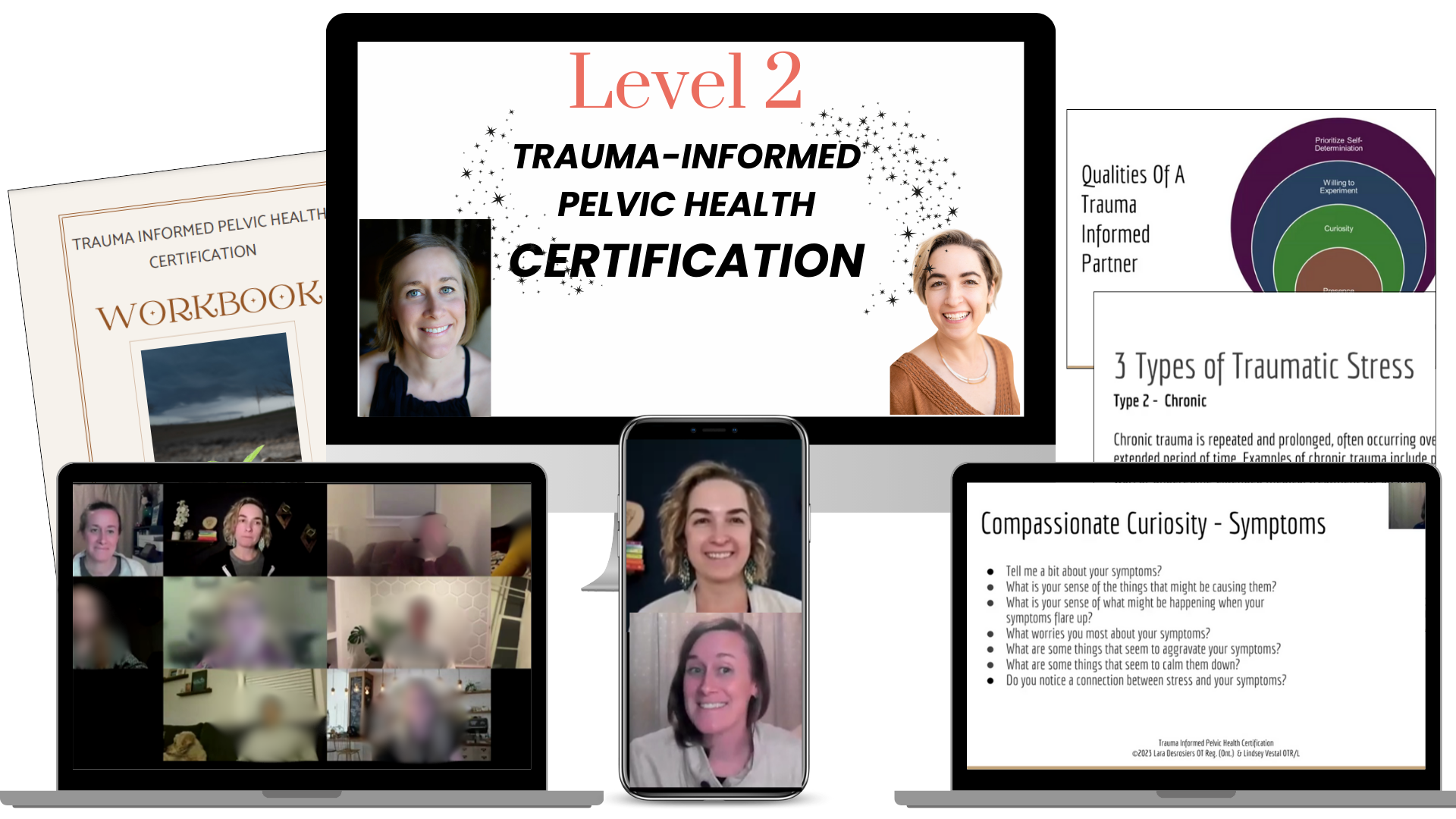From Overwhelmed to Confident in Every Pelvic Health Session
Master the Trauma-Informed Skills That Turn Emotional Breakthroughs Into Healing Moments
The first and only certification that teaches you exactly what to do when trauma surfaces during pelvic health treatment. No more freezing. No more guessing. Just clear, confident care that gets real results.
Being trauma-informed isn't a "nice" to have in pelvic health - it is absolutely essential to the well-being and care of our clients.
IMPORTANT: Only 50 spots will be available for the upcoming enrollment. Make sure to sign up to the interest list so you don't miss the communication.
Receive AOTA CEUs for Completing The First and Only Trauma-Informed Pelvic Health Certification

The Functional Pelvis is an AOTA Approved Provider of professional development. Course approval ID# # 0000008352. This Blended/Hybrid course is offered at 3.2 CEUs, Advanced Level, OT Service Delivery and Foundational Knowledge.

Do Any of These Sound Familiar?
- Your client suddenly starts disassociating during internal work and you don't know whether to stop or continue
- You ask "How are you feeling?" and get met with silence, tears, or "I'm fine" when they're clearly not
- Sessions feel stuck despite trying every manual technique you know
- You go home replaying sessions, wondering if you said the wrong thing
- Clients cancel frequently or seem to avoid certain treatments
- You feel like you're walking on eggshells, afraid to trigger something
If you're nodding along, it's not your fault.
If You've Ever Felt Your Heart Race When a Client Started Crying During Treatment... You're Not Alone
Each week, an OT reaches out to me with a message similar to the one I received from Sarah (an OT in Michigan):
"My client broke down sobbing during what should have been a routine session. I froze. I had no idea if I should stop, keep going, or what to say. I felt like I was making everything worse. I went home that night questioning if I'm cut out for this work."
Does this sound familiar? You're working with the most intimate, vulnerable parts of your clients' bodies, yet you feel completely unprepared when trauma surfaces. And it ALWAYS surfaces.
The truth is: You can't effectively treat pelvic dysfunction without addressing trauma. Yet a lot of pelvic health training programs barely touch on this critical piece.
In our pelvic health sessions, we work with the most emotional and sensitive parts of our clients' bodies, yet it's easy to feel unprepared for what surfaces.
Trauma is everywhere in your sessions:
- In the stories your clients don't share during intake
- When they're showing up committed but aren't getting better despite you "trying every technique"
- When they feel disconnected from their body and lack agency and control
- In those lingering symptoms despite commitment and a giant basket of techniques
And that's because you haven't gotten to the source of the problem.
We all know the buzz terms around nervous system and trauma, but without specialized, formalized training, many pelvic floor therapists feel unprepared and underconfident. Which means clients aren't getting the care they need - and in some cases, they're actually worse off if sessions worsen their trauma response.
Without a trauma-informed approach, you risk not just failing to serve your clients fully - you might actually be making it worse.
That's exactly why we created the first and only Trauma-Informed Pelvic Health Certification, combining in-depth knowledge with practical training you'll use in every session.

"I've been an OT for 14+ years and was completely burned out - I actually wondered if I'd chosen the wrong profession. This course taught me to use nervous system regulation and somatic practices as valid first-line approaches. From intake to discharge, I feel so much more confident and prepared to do this work."
- Dara Steinberg, OTR/L
Here's Exactly What Changes When You're Trauma-Informed
In Your Sessions:
- No more freezing when clients cry or have emotional reactions
- Confidence to navigate any trauma response that surfaces
- Ability to turn defensive reactions into open, healing conversations
- Skills to create deep safety that accelerates physical healing
For Your Clients:
- Faster progress because you're addressing root causes, not just symptoms
- Deeper trust that allows them to fully engage in treatment
- Lasting results instead of temporary symptom relief
- Feeling truly seen and understood in their healing journey
For Your Practice:
- Reputation as the practitioner who gets results with "difficult" cases
- Referrals from clients who've experienced profound healing
- Personal fulfillment from doing the work you trained to do
- Protection from burnout through proper trauma-informed boundaries
The Core Skills You'll Master:

- Master the Art of Emotional Navigation: Learn to confidently guide your clients through unexpected emotional surges with grace and professionalism, turning "What do I do now?" into "I have the skills to handle this."
- Speak the Language of Healing: Adopt the precise language that resonates with your clients, ensuring you ask the right questions and provide answers that empower, not alienate.
- Balance Empathy with Self-Care: Discover strategies to maintain your own emotional equilibrium while holding space for your clients' pain, so you can serve without the cost of your own well-being.
- Demystify Trauma-Informed Care: Cut through the buzzwords to grasp the true essence of trauma-informed practice, making it more than a label in your toolkit—it becomes your second nature.
- Harness the Power of Somatic Wisdom: Uncover the subtle language of the body to help clients reconnect with their somatic experiences, facilitating a deeper healing that transcends words and taps into the body's innate wisdom.
- Navigate the Delicate Terrain of Trauma: Learn how to foster a safe environment where clients feel seen, heard, and supported on their journey to recovery.
- Empower with Precision: Learn how to empower your clients to understand and release their trauma, transforming it from a part of their identity into a step towards their empowerment.


- Calm the Nervous System: Equip yourself with an array of techniques for nervous system calming, providing your clients with the peace they need to heal from within.
- Transform Client Conversations: Turn defensive reactions into open dialogues by learning the art of communication that respects boundaries and encourages trust.
- Expand Your Therapeutic Toolkit: Integrate somatic and psychosocial interventions seamlessly into your sessions, offering comprehensive care that addresses the root cause, not just the symptoms.
- Cultivate Deep Safety and Trust: Develop the ability to create an environment of deep safety and trust, where clients can reveal their stories and embark on their healing journey with you as their steadfast ally.
Your Transformation Timeline: What to Expect Each Month

Month 1: Foundation & Confidence
- Master the fundamentals of trauma response and nervous system regulation
- Feel immediately more confident when emotional reactions surface in sessions
- Learn the exact language to use when clients become dysregulated
- Start implementing basic safety and grounding techniques

Month 2: Integration & Skill Building
- Seamlessly weave trauma-informed approaches into your existing treatments
- Confidently navigate complex emotional disclosures
- Notice your clients beginning to trust you more deeply
- Develop your intuition for reading nervous system states

Month 3: Mastery & Advanced Application
- Handle any trauma response with grace and professional competence
- See dramatic improvements in client outcomes and session effectiveness
- Feel completely prepared for your most challenging cases
- Become the practitioner other therapists refer their "difficult" clients to
By graduation day, you'll be the trauma-informed pelvic health practitioner you always wanted to be.
And Here's How It Works:

When Was The Last Time You Felt COMPLETELY CONFIDENT In The Treatment Room?
Our Trauma-Informed Pelvic Health Certification equips you to support your clients' deepest needs WITHOUT feeling out of your depth.
If you are...
... EXHAUSTED from hitting the same roadblocks with manual techniques that don't address the underlying issues
... FRUSTRATED by the sense that there's a missing piece in your practice that could unlock true healing
...and YEARNING to connect with your clients on a level that fosters genuine progress and profound healing
...then this Trauma-Informed Pelvic Health Certification is perfect for you.
YOUR CLIENTS ARE SEEKING HEALING—BE THE BRIDGE TO THEIR RECOVERY
The Trauma-Informed Pelvic Health Certification is an intensive 3.5-month mentorship program combining online coursework and live group coaching that teaches you not just the “why” but also the “how-to”
EVEN IF you're new to trauma-informed practice: Our certification is designed to build your understanding from the ground up, providing you with the foundational knowledge and skills you need to confidently support your clients.
EVEN IF you've felt overwhelmed by emotional client reactions in the past: We'll equip you with practical tools and strategies to maintain your composure and provide effective care, even in the most challenging moments.
EVEN IF you're relatively new to pelvic health: As long as you've completed OT Pioneers or an equivalent foundational course and have the opportunity to practice hands-on, this certification will guide you to apply and refine your skills, ensuring you grow in confidence and competence with each session.
EVEN IF you've tried other trainings and didn't see a change: Our approach is unique, focusing on experiential learning and real-world application that translates into tangible results in your practice.
DEEPER HEALING. STRONGER TRUST. GREATER IMPACT.
…and A LOT of support along the way

Here's what this investment delivers:
- Confidence to handle ANY emotional response in sessions
- Clients who see faster, lasting results
- A reputation as the practitioner who gets results with "difficult" cases
- Protection from burnout through proper trauma boundaries
- 3.2 AOTA CEUs to advance your career
30-Day Confidence Guarantee
If you don't feel significantly more confident handling emotional responses in your first 30 days, we'll refund your investment completely.

Your Blueprint for Healing: Inside the Trauma-Informed Pelvic Health Certification Curriculum
You'll complete 9 online modules, attend twice a month mentoring calls (these are recorded), and successfully submit a case-study for review to earn your Trauma-Informed Pelvic Health Certification

1. Introduction To The Course
- Program Objectives
- Housekeeping - Orientation to calendar, expectations for certification, workbook, library of audio & video practices, library of scripting options
- The importance of self-care

2. Defining Trauma
- What is Trauma?
- Prevalence of Trauma
- Understanding Post Traumatic Stress Disorder
- Defining Traumatic Stress - chronis, complex & development
- Trauma Myths
- Defining Trauma Informed Care
- To Screen or Not to Screen? Inviting Disclosure

3. Impact of Trauma - Acute Stress
-
Survival Responses
-
When the Threat Passes
-
Human Coping Patterns
-
Client Translation - Compassionate Curiosity

4. Impact of Trauma - The Nervous System
-
The Polyvagal Theory
-
Neuroception & The Window of Tolerance
-
Co-Regulation & Tracking
-
Client translation:
-
Tracking & developing the skill of dual awareness.
-
Helping our clients get to know and track their nervous system in daily routines.

5. Impact of Trauma - The Brain
-
The Brain in the Window of Tolerance
-
The Brain on Stress
-
Disintegration
-
Trauma, Pain & Sensory Processing: Making connections
-
Client Translation - Mitigation and Response
-
Client Translation - Optimizing Presence Using The Senses

6. Impact of Trauma - Behavior
-
Understanding Complex & Developmental Trauma
-
Long Term Impact - The ACES Study
-
Behavioural Defences
-
Client Translation - Responding to Armour
-
Client Translation - The Wisdom of Emotions

7. Trauma Informed Care
-
Qualities of a Trauma Informed Pelvic Health Practitioner
-
Responding to Trauma Disclosures
-
Responding to Self-Preservation/Survival Responses
-
Graded Exposure & Titration: Promoting Safety & Self-Efficacy
-
Client Translation - Stages of Trauma Recovery: When & How to Refer to Trauma Focused Therapy

8. Somatics in Trauma Informed Pelvic Health Care
-
Survival responses from a somatic lens
-
Polyvagal theory and the vagus nerve
-
Making connections: The postural system & the pelvic floor
-
The Sensory Systems: Keys to restoring regulation
-
Interoception
-
Client translation - When & how to use somatic practices
-
Principles of the the Polyvagal Theory from a Somatic Lens: Autonomic Hierarchy, Neuroception and Co-regulation
-
The Vagus Nerve in Trauma Informed Pelvic Health: Tools for Vagus Stimulation

9. Safety, Connection & Empowerment/Dignity
-
Tying it together
-
Universal TIC considerations:
-
Environment & inclusion
-
Relationship
-
Screening
-
Assessment
-
Treatment planning
-
Discharge
Here's Some Critical Details
Attend Live Support Calls
Submit Certification Case-Study + Workbook By April 15th
Attend Virtual Graduation Party May 20th
What Is The Cost?
Do You Offer AOTA CEUs?
About Your Instructors
Lindsey Vestal, OTR/L
Lindsey is the founder The Functional Pelvis which was the first pelvic health practice in NYC ran by an occupational therapist.
She host a weekly OT Empower Hour on her Facebook Page "OTs for Pelvic Health" which has over 8,400 members.
Since 2018 she has been training other OTs in Pelvic Health through her popular online courses. She aims to train over 10,000 OTs by the year 2030 with more than 3,000 completing this certification.
In 2022 she launched her top rated podcast called OTs in Pelvic Health to further support and spread the word.

Lara Desrosiers, MSc. OT Reg. (Ont)
Lara is an Occupational Therapist with a keen interest in mental health, pelvic health and pain science. She has worked in community mental health and addictions settings since 2009.
She is an advocate of integrating a deeper understanding of pain, the nervous system, and the body into mental health care and of integrating a deeper understanding of psychology and trauma into rehabilitation practice.
Lara launched her private practice, Pelvic Resilience, In Ontario, Canada in 2017 which has a mission of supporting individuals experiencing pelvic floor dysfunction and persistent pain to get back to living life.
Lara is a teacher, mentor, and passionate advocate of the value of the Occupational Therapy lens in pelvic health care. Lara is also a teacher and mentor to clinicians interested in developing their psychologically-informed and trauma-informed practices.

